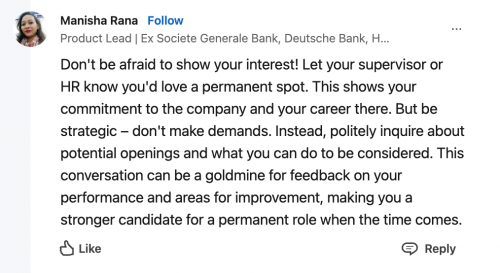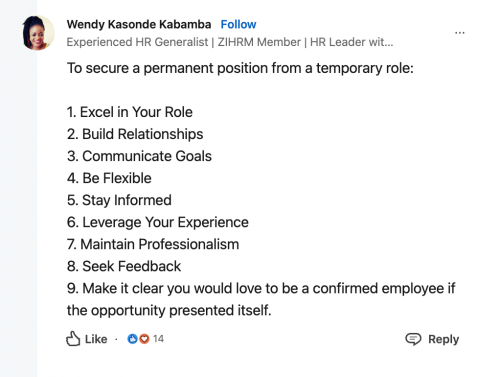Can a contract employee become permanent? Absolutely. Businesses hiring temporary staff will often consider these candidates for a permanent role, depending on the needs of the company.
In this guide, I will provide employees and employers with guidance on temp to perm employment, covering everything from:
- What temp to perm means
- Tips to help make your employer want to keep you on permanently
- Tips for employers wanting to convert a temp hire to a permanent employee
What Does Temp to Perm Mean?
Temp to perm means a job starts as a temporary position with the potential to become permanent, typically within 3 to 6 months.
Think of it as a trial run - employers get to see if a candidate is the right fit before making a long-term commitment, while employees have the chance to test the waters before fully diving in. The exact timeframe depends on the company and industry, but it’s usually set out at the start of the contract.
If you’re currently looking for a temporary role, you might want to check out our temp work guide.
How Does Temp to Perm Work?
Typically, an employee starts in a temporary position with the understanding that it may lead to permanent employment if both parties are satisfied. This arrangement gives both the employer and employee a chance to evaluate if they're a good fit for each other before making a long-term commitment.
How Often Do Temp-To-Perm Positions Become Perm?
From my experience with temp recruiting, a significant portion of temp-to-perm positions lead to permanent employment under the right conditions, but success depends on the worker’s performance, the company and the industry.
Many businesses genuinely use this model to assess fit before committing to a long-term hire, and candidates who demonstrate value, build strong relationships, and align with company culture are more likely to secure a permanent offer.
While not every temp-to-perm role leads to permanency, many professionals have successfully transitioned by proving their worth. For those looking for flexibility and opportunity, temp-to-perm remains a valuable career path.
This top-rated comment on Reddit explains what companies are generally looking for well:
Comment
byu/Emotional-Ebb8321 from discussion
inrecruitinghell
How Long Is a Temp to Perm Contract?
Temp to perm contracts typically last 3-6 months but can vary depending on the company and position. This period allows both employer and employee to assess fit. Some contracts may be as short as a few weeks or may extend up to a year. The exact duration is usually specified in the initial agreement.
What Is the Difference Between Temp and Temp to Perm?
Temporary work tends to be short-term jobs with a defined end date. Employees are hired for a specific period or project, typically to cover leaves, seasonal work, or temporary increases in workload. There's usually no expectation of continued employment beyond the agreed term.
Temp to perm roles, on the other hand, start as temporary but have the potential to become permanent. These positions allow both employer and employee to evaluate fit before committing to long-term employment. If the arrangement proves successful, it often leads to a permanent job offer. This approach reduces hiring risks for companies and gives workers a chance to "test drive" the job and company culture.
Is Temp to Perm a Good Idea?
For many, I’ve seen it be an excellent opportunity to get a foot in the door at a desirable company and then secure a full-time position. It allows both parties to assess compatibility before making a long-term commitment.
How to Go from Temp to Perm As An Employee
While there is no guarantee that you’ll receive a permanent job role as a temporary recruit or freelancer, you are definitely in an advantageous position should you wish to stay at the company. Here are my tips for how to make a temp job permanent:
1. Be a Team Player
Most organisations I’ve worked with are looking for people who can work well in a team. After all, someone who creates conflict and doesn’t get on well with others isn’t going to make the staff atmosphere great. While you will have your own duties, try to build connections with other employees as much as possible, offer your assistance if you can and become part of the team. It’s much more difficult to lose a temporary staff member who becomes an integral part of the team.
2. Treat the Job as A Permanent Position
In my experience, temporary workers who treat a job as if they’re only going to be there for a short amount of time do not land perm positions. Those who ask questions about the company and attempt to go the extra mile to achieve work goals, such as going above and beyond by exceeding deadlines, are much more likely to be taken on permanently.
Additionally, try searching for ways to make your duties extra efficient. Demonstrating a strong work ethic is key in helping you convert your temporary employment to permanent.
3. Express Your Interest
Make sure you mention to your boss that you’re interested in a permanent role with the company. See below for my guidance on how to approach this conversation. Find out what is required to obtain a permanent role. When it’s time for the business to fill permanent vacancies, ensure you’re considered. This will make it more likely for you to land a permanent contract.
I thought Manisha Rana expressed this well in her LinkedIn contribution:
4. Know the Company
Find out as much as you can about the company. What are their short-term and long-term goals? What is their history? What are their values? Once you know the answers to these questions, you can start to consider how you can help to meet their intentions and how your skills can assist the business in the long term.
5. Be Proactive
Coming into a company with a fresh perspective can help you to be proactive with your approach. For instance, you may be able to determine how the business can be more productive, cut costs, use more effective systems, etc. Note down your ideas and share them with key decision-makers. You could also volunteer for any additional opportunities. Showing this level of initiative showcases your potential for becoming a long-term employee.
6. Always Be Reliable
Lateness and lots of absences don’t reflect well when you’re a temporary member of staff. Be as reliable as you possibly can. Communicate well with other employees, show up on time to work and meetings, and always deliver the highest quality of work.
7. Show Your Value
There are many ways to show your value in your job, whether that involves meeting KPIs, establishing relationships with key employees or creating seamless processes. Assisting others to meet their goals is also important. When it comes time for your employer to deliver your performance review, they’ll be able to see that you’re a valuable asset to the business.
8. Be Enthusiastic About Your Position
Showing enthusiasm about your role gives you a great advantage. If you can showcase your commitment and flexibility in your temporary job, people will be able to see that you’re part of the business. Offer to work late if required, provide holiday cover for other employees or be flexible in your shifts. Any way you can display your enthusiasm helps you to become even more valuable to the company.
9. Understand Company Culture
Discover early on what type of company culture exists. This could be working through lunch, joining in with extra activities outside of work or participating in company charity events. Understanding company culture ensures you can fit into the business from day one and adapt to different work environments.
10. Network, Network, Network
I believe networking is one of the most effective ways to transform your temporary role into a permanent position. Even if you leave the company after your temp contract ends, if you network with the right people, you may be brought back for a permanent position at a later date.
11. Be Unique
Standing out from the crowd is a great way to show your potential as a long-term employee. You’ve been hired for your skills, so think about how you can use them in a way that sets you apart from others. Remember, you are also your own brand. What else can you bring to the company? Do you have any unique skills you can bring to the team?
12. Set Your Own Goals
Create your own schedule to turn your position into a permanent role. Maintaining control of your own goals, as well as making notes on how you’re going to get there, keeps you proactive in achieving them. Additionally, you can note down other tips on this list with a timetable for when you’re going to achieve specific steps. For example, talk to your boss about the possibility of a permanent contract. See below for my tips on how to do this.
13. Stay Motivated
While it can take some time to establish yourself at a workplace when temping, it’s important not to lose motivation. I’ve collated this list of motivational podcasts that you might find a good starting point to give you the confidence boost and professional advice you need.
Wendy Kasonde Kabamba shared this handy checklist on LinkedIn that I think is worth saving and referring back to:
Signs Your Temp Job Will Become Permanent
While there's no guarantee, having worked with plenty of temp workers and recruiters in my time, I’ve noticed there are certain indicators that your temporary position might be heading towards permanency, including:
- Increased responsibilities
- Invitations to long-term planning meetings
- Positive feedback from supervisors and colleagues
- Extensions to your original contract
- Discussions about future projects
How to Ask Your Boss for a Permanent Position
This is one thing the temporary workers I work with ask me about often. If you know you want to stay on at the company beyond your contracted position, it’s so important to express this desire to your line manager or HR contact.
Here are some tips to approach this conversation with your boss:
- Schedule a formal meeting to discuss your future with the company
- Prepare a list of your accomplishments and contributions during your temp role
- Research the company's needs and explain how you can fulfil them long-term
- Express your enthusiasm for the company and your role
- Be ready to discuss your long-term career goals and how they align with the company
- Ask about the possibility of a permanent position and what steps you need to take
- Be open to feedback and willing to improve in areas where you may be lacking
- Follow up the conversation with an email thanking your boss for their time and reiterating your interest
Remember to be professional, confident, and prepared for any outcome. The conversation may not turn out the way you want it to, but you never know what might happen down the line, so it pays to remain professional and positive at all times.
You may also be interested in reading:
- How to List Temp Work on Your CV
- Temporary Job Interview Questions & Answers
- Temporary vs. Fixed Term Contract - What’s the Difference?
Can You Get a Raise from Temp to Perm?
One question I get asked a lot by candidates is: ‘Do you get a raise from temp to permanent employment?’ The truth is that it really depends on the individual company. Some employers may give their employees a raise, while others may require salary negotiations.
In other instances, you may have to take a pay cut as your permanent role will come with extra benefits, such as gym membership, free parking, health benefits and more. If you don’t receive a wage increase, you may want to ask if a salary negotiation is possible before you sign a permanent contract.
If securing an increased salary is essential for you, read our guide on how to negotiate a pay rise here. When you work with Oriel Partners, we will assist by negotiating the salary on your behalf.
Careers influencer Kennie Bukky has created a short TikTok video giving her perspective on how to negotiate a salary when moving from temp to perm. I recommend you give it a watch.
@kenniebukky Replying to @naooue hope this helps! #salarynegotiation #salary #payrise #howtonegotiatesalary #howtogetaraise #careertiktok #corporatetiktok #careertips ♬ original sound - Kennie Bukky | Career + Money
How to Convert a Temp Hire to a Permanent Employee
If you have recently hired a temporary employee and you are keen for them to stay on at the company on a permanent basis, here is some more information about the usual temp to perm hiring process.
Of course, if you’re working with our team at Oriel Partners, we can manage this process on your behalf.
1. Evaluate Performance
Thoroughly assess the temporary employee's performance, skills and fit within the wider team. Look at their productivity, quality of work and ability to meet deadlines. Consider feedback from colleagues and supervisors who have worked directly with them. Review any metrics or KPIs relevant to their role to get a comprehensive picture of their contributions.
2. Consider Long-term Needs
Carefully determine if the role filled by the temp worker aligns with your company's long-term goals and if there's a sustainable need for this position. Evaluate upcoming projects, potential growth areas and how this role fits into your overall organisational structure. Consider how the position might evolve over time and whether the employee has the potential to grow with it.
3. Review Budget and Resources
Ensure you have the financial resources to support a permanent position. Factor in potential salary increases, training costs, and any necessary equipment. Consider the long-term financial impact and ROI of converting this position from temporary to permanent.
4. Consult with HR
Work closely with your Human Resources department to understand the necessary paperwork for converting a temp to a permanent employee. Discuss any changes to employment status and company policies that may apply.
5. Check Contract Terms
Carefully review the agreement with the temp staffing agency, if applicable, to understand any transfer fees or restrictions related to hiring their temporary worker. Look for clauses about transfer fees or notice periods.
You may be interested in reading:
- How to Use Temp Agencies to Hire Temp Staff
- 9 Reasons to Hire a Temp in 2025
- Best Temporary Payroll Services in the UK
6. Prepare an Offer
Put together a competitive compensation package, including salary and benefits appropriate for a permanent position. Consider industry benchmarks, the employee's experience and your company's pay structure. Include details about pensions, paid time off and any other perks or benefits your company offers.
For PA and admin roles, check out our annual Salary Survey to see what you should expect to pay.
7. Have a Formal Discussion
Schedule a private meeting with the temporary employee to discuss their interest in a permanent role and your desire to bring them on full-time. Use this opportunity to gauge their long-term career goals and how they align with your company's vision. Be prepared to answer their questions.
8. Negotiate Terms
Be prepared to negotiate salary, benefits and a start date for the permanent position. Listen to the employee's expectations and be ready to explain your offer in detail. Be flexible where possible but also clear about any non-negotiable aspects of the offer.
9. Provide a Written Offer
Once terms are agreed upon, present a formal written offer of employment. Ensure the offer letter clearly outlines all aspects of the position, including job title, responsibilities, pay, benefits and start date. Include any conditions of employment, such as background checks, if required. See our job offer letter template for inspiration.
10. Plan the Transition
If the offer is accepted, create a transition plan. This may include ending the relationship with the staffing agency, adjusting the employee's responsibilities, and integrating them fully into your company's systems and culture. Consider any additional training or orientation needed for their new permanent status.
11. Onboarding
Even though the employee is familiar with your company, conduct a proper onboarding process to ensure they understand all aspects of their new permanent role and benefits. This might include meetings with HR to discuss benefits, introductions to new team members or departments they'll be working with, and setting up long-term goals and expectations.
12. Announce the Change
Inform your team and relevant departments about the employee's new permanent status. Update organisational charts and contact lists to reflect the change.
Work with Oriel Partners - Temporary Recruitment Specialists in London
Whether you’re looking for a temporary position or you’re looking to hire a temporary employee, we can help! We specialise in placing temporary candidates in support roles, including administrators, PAs, EAs and office managers. As experts in the temp to perm recruit process, we can guide both employers and job seekers through the transition. Get in touch today for help from one of our temporary recruitment specialists and take the first step towards finding your ideal opportunity!




